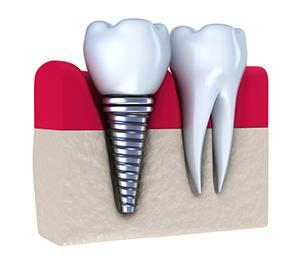 What's the best way to replace teeth lost to gum disease, decay, or trauma? The answer depends on many factors, but over the past few decades, more patients have been choosing dental implants to restore a gap in a smile.
What's the best way to replace teeth lost to gum disease, decay, or trauma? The answer depends on many factors, but over the past few decades, more patients have been choosing dental implants to restore a gap in a smile.
Whether you need is to replace one tooth or several, the dental implant procedure works for patients who have healthy gums and enough jaw bone to support the metal screw or screws that form the foundation of a dental implant. In fact, the American Dental Association and other dental authorities state that dental implants have a more than 95 percent success rate and that implants prevent remaining teeth from drifting and jawbone from deteriorating.
Here's How a Dental Implant Works
Once your dentist has evaluated your mouth with a careful oral examination, x-rays and other imaging, he will begin the dental implant process. While this is truly a surgical procedure, nothing more than a local anesthetic is usually required.
Your oral surgeon will place a metal screw directly into the jaw bone. This screw is made of an amazingly biocompatible material, titanium. Bone accepts this metal so well that it actually grows around the screw in a process called osseointegration. During healing process, the implant becomes securely anchored to the jaw. The surgeon then attaches another metal piece, called an abutment, onto the implant.
In a subsequent visit, the dentist will glue a natural-looking and color-matched porcelain crown to the abutment. Together, the screw, abutment and crown form the finished implant. Adjusted for bite and well-matched for color, shape and size, this lifelike restoration looks, feels and functions just like a natural tooth. Implant patients enjoy normal speaking, chewing and a revitalized look to their smile. The jaw bone benefits from increased density and strength.
Who Can Get Dental Implants?
Again, healthy gums and sufficient bone are important, although there are procedures to heal diseased gums and to augment jaw bone that is too narrow or not adequately dense. In addition, implants may be used to support a multi-tooth bridgework or a full set of removable dentures.
People who are conscientious about dental hygiene make the best candidates for the implant procedure. While implants do not decay, gum disease is still a danger. Patients must floss daily and brush twice a day just as they would natural teeth. Routine cleanings and dental exams are a must as well.
Mark E. Richardson DDS
To return your smile to its healthiest and brightest best, call Dr. Mark E. Richardson in the Kalamazoo, Michigan area. He and his friendly staff would love to lend their expertise to helping you decide about dental implants. Call their family dentistry office today at 269-343-6907.
